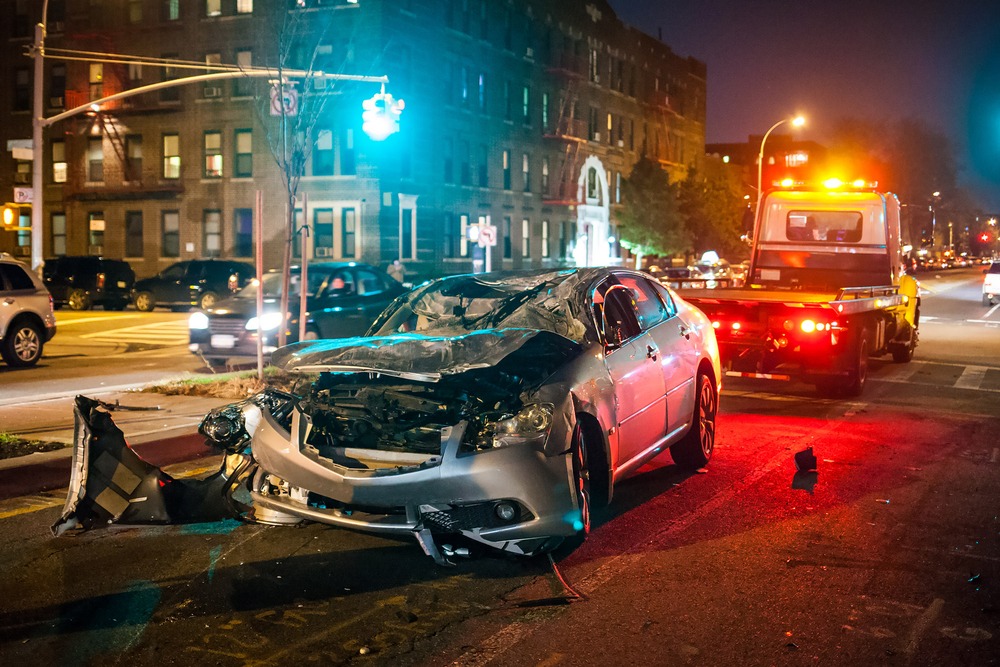A car’s engine might stall for various reasons, such as a malfunction caused by a lack of maintenance or a factory issue. If this happens on the highway, proceed with caution to ensure your safety and that of other drivers.

Remain Calm
Remaining calm is essential to avoid making life-threatening mistakes.
Safely maneuver your vehicle to the shoulder when it is safe to do so. Immediately activate your car’s hazard lights to alert other drivers and prevent them from colliding into your vehicle. Place warning signs such as safety triangles or a flare if you have them.
Call for Help
Request assistance as soon as possible. Avoid any repairs or maintenance on a busy highway as the potential for a crash is high.
Call 911 if your vehicle poses a hazard to other highway drivers. If you aren’t in immediate danger or your vehicle doesn’t pose a threat to others, call a roadside assistance service, your insurance provider, or a tow truck to help you.
Use Caution If You Exit the Vehicle
If you need to exit your vehicle, always check for oncoming traffic before opening the car door and exit through the passenger door if you can. Keep a safe distance from the road and stay behind any barriers or guardrails if present since drivers do not expect to encounter pedestrians on the highway.
Common Reasons For Motor Vehicle Stalls
There are many fuel, air flow, or other mechanical issues that can cause a car engine to stall. Some of the most common reasons include:
- An empty gas tank
- A poor fuel mixture
- Dead car battery, faulty alternator, fuel pump, or EGR valve
- Poor airflow due to a dirty air filter or low fuel pressure
- Clutch release issues (only in manual transmission vehicles)
- Ignition problems or the coolant sensor reading hot
- A depleted battery in electric or hybrid vehicles
What You Should Do If an Accident Occurs
If another vehicle collides with you when your car stalls on the highway, it is essential to follow the proper steps to mitigate the situation. Here is what you should do:
Call Emergency Services
If you or someone else is hurt, contact emergency services right away so they can assess the situation and provide medical assistance. If you end up pursuing a personal injury claim, a medical record is a crucial piece of evidence to support it when you are seeking compensation.
Gather Evidence
You should gather evidence if you can, but keep in mind that highways are extremely dangerous. Try to take clear photos of the damaged vehicles, road conditions, and your injuries from a safe distance.
If other drivers who witnessed the accident stop nearby, you should request their contact information. Also, be sure to get the contact and insurance information of the other drivers involved in the accident.
Report the Accident
It’s also essential to report the accident to your insurance provider. If the damages are worth more than $750,000, you only have a ten-day window to report the incident to the Department of Motor Vehicles (DMV).
Consult a Personal Injury Lawyer
Highway car accidents are highly traumatic experiences that can result in severe or fatal injuries and excessive property damage. They may result in the development of mental health disorders, such as post-traumatic stress disorder (PTSD) or other emotional and psychological conditions.
In these situations, victims may be entitled to compensation for their damages and other losses. Since the accident occurred due to your car stalling, there might be other liable parties in your claim, such as vehicle or parts manufacturers.
Also, your stalled car might be used as a reason to shift all or some of the blame to you by the other parties involved in the accident. Because of this and other complexities related to highway car accidents, you should consult a car accident attorney to understand your rights and legal options and guide you throughout the process.
A car accident law firm can aid you in proving fault or getting assigned a lower percentage of fault if the evidence shows some negligence on your part. Contact The Roberts | Jeandron Law Firm to learn more and receive a free consultation about your case.

 By:
By: